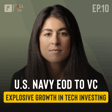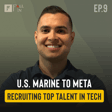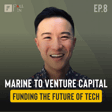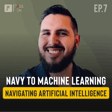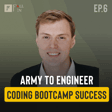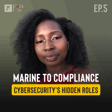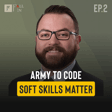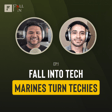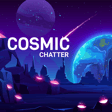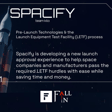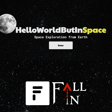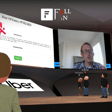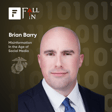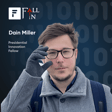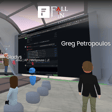Become a Creator today!Start creating today - Share your story with the world!
Start for free
00:00:00
00:00:01

Drop Shop
DropShop is a crowd-sourced fundraising platform that provides humanitarian donation items for individuals in crisis situations and or disaster / war zones. We're going to talk about what it's like to be a part of this movement, why it matters, and how you can get involved.
Edit: Sorry for the audio issues. User error on my end.
Transcript
Introduction and Hackathon Overview
00:00:01
Speaker
Awesome. Thanks guys for joining the fall in hackathon podcast. You guys just did our recent April benefit hackathon benefiting the people of Ukraine. You guys want second place drop shop. Spencer, you're the team leader. Why don't you kind of kick it off and tell us a little bit about yourself and the project. Yeah, my name is Spencer Rhodes. I'm a UX UI designer. First time doing a hackathon with
00:00:30
Speaker
with fall in and Zincaster.
Team Formation and Project Pitch
00:00:33
Speaker
And yeah, I met up with Eptisom and Montasser and then they pitched a really great idea and I got excited just out of the get go. Awesome. And then Eptisom, do you want to give your background and how you got involved as well? Sure. I'm Eptisom. I'm a computer science PhD student at George Mason. I came across fall in
00:00:59
Speaker
I think on Google and I thought it was pretty cool. So we signed up for it. I told him about it and yeah, that's kind of how we found out about this hackathon.
Project Motivation and Concept
00:01:11
Speaker
Cool. And then what's your background? I remember you introduced yourself, uh, your, your PhD student. Is that right? Yeah. Very awesome. Yeah. Um, what are you, uh, uh, working on?
00:01:28
Speaker
So this semester, I'm working on some interdisciplinary projects. Right now, I'm working on reducing barriers to access in health care for Virginia. Very cool. Sweet. And so how did you guys come up with the idea for this project? Natasha, do you want to take that? Sure. So basically, we
00:01:58
Speaker
First of all, we were motivated by the objective of the hackathon to help people in Ukraine and to help in general expand to helping people in disaster affected areas. And we were really motivated by the fact that a lot of people do want to contribute in a meaningful way.
00:02:23
Speaker
And sometimes it's just not feasible for making a direct contribution when you're not really sure who's doing what on the ground and what kind of impact your donations might have or your outreach might have. And this kind of coupled with the idea that we do have a lot of people with some kind of digital communication access
00:02:50
Speaker
still in Ukraine and in general in other areas like this, where they might need some immediate assistance in forms of small amounts of supplies or even with day-to-day purchases. And this could be definitely facilitated by using technology that we have that
00:03:13
Speaker
that sometimes we almost take for granted. For example, like DoorDash, Postmates, or Uber Eats, and combining this technology with the available resources at hand, I think that really motivated me to think about this in a different way, and that's when I pitched this idea out.
00:03:38
Speaker
And we kind of fleshed it out over a couple of days when we were talking about how could we make the most impactful platform. And once that happened, we started.
Project Development and Execution
00:03:52
Speaker
Audio pickups here, which we're sort of used to with the hackathon. Spencer, do you want to kind of
00:04:01
Speaker
take it from here? Yeah, I'll try to pick up where Tosser left off. So when the idea was pushed to me, it really seemed like the basic idea here was in a disaster situation, in a natural disaster war zone crisis situation, you may not have internet access, but in a lot of cases, some people still have the texting ability. So SMS-based,
00:04:29
Speaker
charity really is how to sign up to receive help.
00:04:32
Speaker
as the verification process begins by sending in a text message, a user sends in a text message. If their area code, their phone number is associated with the area in crisis, it kind of expedites the process of verifying them as a real person in need. Then they also, they send in a selfie, just kind of, again, verifying they're a real person, they're in need, and then that's gonna kind of connect them to a network of available aid, whether that's a charity that's already got boots in the ground,
00:05:00
Speaker
Red Cross, you know, International Red Cross, Red Cross Society of Ukraine, depending on the area we're working in, right? And then it's also the next kind of idea that stemmed from it was, how do we, how do we, you know, reignite the community? How do we, how do we keep money, services,
00:05:18
Speaker
Vital funds pumping, you know, through the economy, like in Ukraine, shop owners can't keep their doors open, but they might still have supplies that they didn't move off the shelves. People in Ukraine need those supplies. So it's getting funding to those shops, getting those supplies into the hands of the people that need them. So it's just kind of all...
00:05:35
Speaker
kind of grew off of his one idea of SMS based, you know, signing up for need and it's just kept spiraled. So hopefully it's something that could be used in Ukraine, but also in any disaster zone, right? Like if there's a tornado somewhere in the world or earthquake, tsunami, whatever. Yeah, definitely. I mean, it sounds like it's already robust. And I'm glad it's already out there. You never know what can kind of
00:06:04
Speaker
spring up. I mean, Zencaster itself was born out of a hackathon. And, you know, it's it's doing pretty well nowadays. Yeah, I'm curious, how did you become the team leader?
Team Dynamics and Leadership
00:06:14
Speaker
Was there a process for that? Was it random? What was that?
00:06:19
Speaker
It was, it was pretty random. Um, you know, it was sort of, it was the three of us had joined. There was one other who joined and then she kind of fell off. Um, Mikayla Leatherland, she, she did contribute a little bit. And then there was two other teammates who'd like joined, but didn't really contribute and they just kind of disappeared. But, uh, Mikayla did contribute to some code.
00:06:37
Speaker
and set up the repository. But yeah, with the initial with the three of us, we were just kind of kicking the can back and forth between each other, who's going to be the team leader didn't really seem like anybody wanted to do it. And I've just saw him kind of at one point got vulnerable, just kind of filled her name in on the slide and then felt bad. And then took her name off the slide didn't want to make her do it. So yeah, it was it was really just kind of random.
00:07:05
Speaker
Did you guys know each other before the hackathon or did you guys meet up at the hackathon? Well, what's that been like? We literally met up at the hackathon. We reached out. I was new to this group. I don't know if you and Montaser want to share. I think you guys had shared with me that you'd done some previous hackathons together. Yeah. Can you hear us? Hello.
00:07:33
Speaker
I don't know if we have their audio still or not. They might have lost them. Might have lost them. I know they had, they shared with me that they had met doing a hackathon. And then, and they had done quite a few of these together. So. Oh, uh, this was my first encounter with the two of them, but it sounds like a week before. Cool. And then how did you hear about it again? Uh, so my, my good buddy Steadman. Oh, nice. Do my good buddy Steadman.
00:08:03
Speaker
Nice. Yeah, that guy's really cool. How do you guys know each other? I'm a fellow V-schooler. I went through V-school with Stedman. Stedman also associated with that program. Yeah, I went through V-school myself. Yeah, both veterans. Did you do the UI or the decoding side? I did the coding side. Yeah, spent my time over there. They had their like barracks situation going on.
00:08:30
Speaker
I think nowadays it's all online, if I'm not mistaken, or like a hybrid situation or something. No, it's 100% online. They do have a space downtown that you can go to, kind of a hub situation. But yeah, they're not their permanent. It's mostly all online. It's really grown remote, kind of coast to coast, students all over. It's kind of cool. Yeah. Definitely. So, hey.
00:09:00
Speaker
Yeah, we got you now.
00:09:37
Speaker
Very cool. I am getting some air pop-ups on my end, so I'm keeping my fingers crossed that we're able to record this. But yeah, very cool. I guess let's just keep talking about it. Do you guys have a favorite, I guess, segment of the program? I try to fill it with guest speakers and workshops and things like that, where you guys just
00:10:07
Speaker
like heads down most of the time or did you guys get to check out some of the uh...
00:10:37
Speaker
Do you have anything to add there, Spencer? Yeah, that platform. What was that again? Frame? Frame VR.io. Yeah, that was outstanding. That was my first encounter with that. That was really, really cool to kind of play around with and learn. A lot of cool stuff with the hackathon. But I did get to attend quite a few of those guest speakers and seminars. I'm trying to remember the gentleman's name, the former Marine officer.
00:11:06
Speaker
Brian Berry gave an outstanding talk. A lot of it, honestly. I think mostly I was really just intrigued by the guest judges, the Ukrainian nationalists that we had contributing and offering their advice. I'm just getting some of that real-time advice from somebody in a situation like they're in.
00:11:30
Speaker
Yeah, humbling to hear their their personal stories and then also, you know get that kind of feedback of what would actually be beneficial to them Yeah Yeah, I'm always like surprised who's gonna show up I never know who's gonna show up from where and I think this event we had more attendees from all over the world, I think obviously from not just from Ukraine but South Korea India
00:11:59
Speaker
And another country, I believe. But yeah, it's so fascinating how it just reaches the corner of the earth here. Sweet. And I'm also curious, so Spencer, you were in the Marine Corps, I presume.
Spencer's Personal Journey
00:12:15
Speaker
Did you hit up V-School right after you got out, or did you do something else?
00:12:22
Speaker
No, it's actually, it's been a minute. So I was in the Marine Corps from 2006 to 2012, separated after some medical stuff. Otherwise, I was probably going to be in there for a little bit longer. But I got out, I went to school, tried to use some of my GI benefits, setting like graphic design, just wasn't happy. And at the time, going through college, I was a server bartender.
00:12:49
Speaker
I kind of got sucked into the management role of the restaurant industry because I had kids and I needed insurance and you know just more than a student. So I kind of left school and pursued that career and after you know several years in the restaurant industry being a restaurant manager I just it wasn't the lifestyle that I was
00:13:12
Speaker
wanting to pursue anymore. So we're actually ironically right before the pandemics really erupted in our state. I had stepped down from a general manager position and was looking at schools. And then the pandemic started in the restaurant industry, as you know, it's not quite the same sense. So I think it was good timing. But yeah, ever since then, I've just been studying online, trying to do things like these hackathons to gain experience and break into that tech industry. Awesome.
00:13:41
Speaker
Um, yeah, I guess like, uh, to kind of wrap things up here, do you guys have any critical feedback, um, for the hackathon that we can use to improve? Um, you know, this is our fourth time and, um, you know, it seems like we have repeating users are coming in and hearing some great things. So, um, and we're always trying to improve and, and iterate. Um, yeah. Do you guys have any critical feedback here?
00:14:45
Speaker
Hmm.
00:15:37
Speaker
Sounds good, yeah. Go ahead, please. Awesome. Yeah, you're not the first group to tell us about kind of shifting the Discord. Yeah, I'll have to kind of experiment with that. Spencer, do you have any critical feedback I can use to improve here?
00:16:03
Speaker
Let's see. I love frame. I actually like Slack. I'm not super familiar with Discord, but I think that's a user preference thing, but I'd always love to learn a new tool. So let's get on Discord. Why not? I would say the one piece that I would like to see more of is more, maybe more interaction between the teams. You know, it seemed like
00:16:23
Speaker
everyone kind of had their head down, worked their own thing. I liked the rooms that Frame had where each team had their own room, but then it turned out that each team was just kind of doing their own thing, going to either Discord or their own Slack channel or Zoom link or whatever. So to keep the interactivity of it, interactivity, you know, alive is just, yeah, maybe switching to Discord, having one platform, more interactive activities, you know, stuff like that.
00:16:50
Speaker
Good deal. Sweet. All right guys, any sort of last comments or questions or anything I can help clarify?
00:17:30
Speaker
Thanks for the sir. Um, after some and Spencer. Yeah. Appreciate you guys's time. And yeah, we'll end the podcast now.
